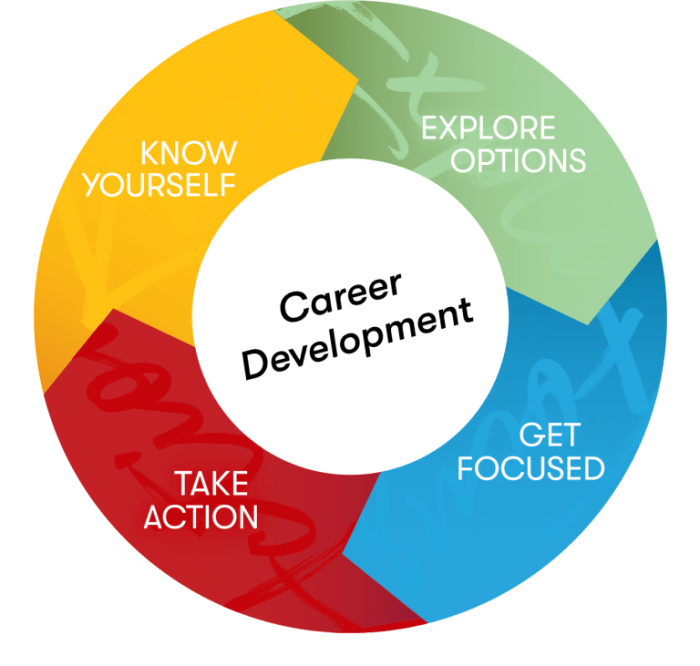Career Growth Strategies are like the ultimate cheat codes for leveling up in your career game. From skill development to personal branding, get ready to unlock the secrets to success in this engaging guide.
Importance of Career Growth Strategies
Career growth strategies are essential for professional development as they help individuals navigate their career paths, set goals, and make progress towards achieving them. These strategies provide a roadmap for advancement, enabling individuals to identify opportunities for growth, skill development, and career progression.
Impact on Career Trajectory
Effective career growth strategies can significantly impact an individual’s career trajectory by opening up new opportunities, increasing visibility within their industry, and positioning them for promotions or higher-level roles. For example, networking strategically, seeking out mentorship, and continuously learning and developing new skills can help individuals climb the career ladder faster and more effectively.
Achieving Long-Term Career Goals
Career growth strategies play a crucial role in helping individuals achieve their long-term career goals. By setting clear objectives, creating a plan of action, and consistently evaluating and adjusting their strategies, individuals can make steady progress towards their desired career outcomes. Whether it’s aiming for a leadership position, transitioning to a new field, or starting a business, having well-defined career growth strategies can make all the difference in reaching these aspirations.
Types of Career Growth Strategies

In the pursuit of career advancement, individuals can utilize various strategies to enhance their skills, expand their network, and seek guidance from mentors. These strategies can be categorized into skill development, networking, and mentorship. Let’s explore these different types of career growth strategies and how they contribute to personal and professional development.
Skill Development
Skill development is essential for career growth as it enables individuals to acquire new competencies, enhance existing skills, and stay relevant in their field. This can be achieved through formal education, online courses, workshops, and on-the-job training. By continuously improving their skills, individuals increase their value in the job market and open up opportunities for career advancement.
Networking
Networking involves building and maintaining relationships with professionals in your industry, potential employers, and other key contacts. Networking can lead to job referrals, career opportunities, and valuable insights into industry trends. Attending industry events, joining professional organizations, and utilizing online platforms like LinkedIn are effective ways to expand your network and enhance your career prospects.
Mentorship
Mentorship is a valuable career growth strategy that involves seeking guidance and advice from experienced professionals in your field. Mentors can provide valuable insights, career guidance, and support in navigating challenges and making important decisions. Establishing mentor-mentee relationships can help individuals gain new perspectives, develop leadership skills, and accelerate their career growth.
Short-term vs. Long-term Strategies
Short-term career growth strategies focus on immediate goals and objectives, such as acquiring specific skills, completing projects, or securing promotions. Long-term strategies, on the other hand, involve planning for sustained career growth over an extended period. Balancing short-term and long-term strategies is essential for continuous professional development and long-term success in one’s career.
Personal Branding
Personal branding is a powerful career growth strategy that involves creating a unique identity and reputation for yourself in your industry. By showcasing your skills, accomplishments, and expertise through online platforms, professional profiles, and personal branding initiatives, you can differentiate yourself from others, attract opportunities, and build a strong professional presence. Personal branding plays a crucial role in shaping how you are perceived by employers, colleagues, and industry peers, ultimately influencing your career growth and success.
Developing a Personalized Career Growth Plan
In order to create a personalized career growth plan, it is essential to assess your current skills, set SMART goals, and align strategies with your values and interests.
Assessing Current Skills and Identifying Areas for Improvement
To assess your current skills, take inventory of your strengths and weaknesses. Identify areas where you excel and areas that need improvement. This can be done through self-reflection, seeking feedback from mentors or colleagues, or even taking skills assessments. By understanding where you stand, you can create a plan to enhance your skills and bridge any gaps.
Setting SMART Goals within a Career Growth Plan
Setting SMART goals is crucial in a career growth plan. SMART goals are Specific, Measurable, Achievable, Relevant, and Time-bound. By following this framework, you can ensure that your goals are clear, attainable, and aligned with your overall career objectives. For example, instead of setting a vague goal like “improve communication skills,” a SMART goal would be “attend a public speaking course and deliver a presentation at work within six months.”
Aligning Career Growth Strategies with Personal Values and Interests
It is important to align your career growth strategies with your personal values and interests to ensure long-term satisfaction and fulfillment. Take the time to reflect on what matters most to you, what motivates you, and what brings you joy in your work. By incorporating these aspects into your career growth plan, you can create a path that resonates with who you are as an individual.
This alignment will not only drive your success but also lead to a more meaningful and rewarding career journey.
Implementing and Monitoring Career Growth Strategies

Implementing and monitoring career growth strategies is crucial for professional development. By effectively putting these strategies into action and regularly assessing progress, individuals can ensure they are on the right path towards achieving their career goals.
Methods for Effective Implementation
- Set Clear Goals: Define specific and achievable career goals to guide your actions.
- Time Management: Allocate time each day for tasks that contribute to your career growth.
- Seek Feedback: Solicit feedback from mentors or supervisors to adjust your strategies accordingly.
- Continuous Learning: Stay updated with industry trends and acquire new skills to enhance your career growth.
Significance of Self-Assessment and Progress Tracking, Career Growth Strategies
Regular self-assessment allows individuals to reflect on their strengths, weaknesses, and areas for improvement. By tracking progress, one can measure the effectiveness of their career growth strategies and make necessary adjustments to stay on course.
Tools and Resources for Monitoring Progress
Utilize tools like career journals, performance reviews, and goal tracking apps to monitor your progress effectively.
- Career Journals: Keep a record of achievements, setbacks, and reflections to track your professional growth.
- Performance Reviews: Use feedback from performance evaluations to gauge your development and identify areas for improvement.
- Goal Tracking Apps: Utilize apps like Trello or Asana to set goals, track progress, and stay organized in your career journey.
